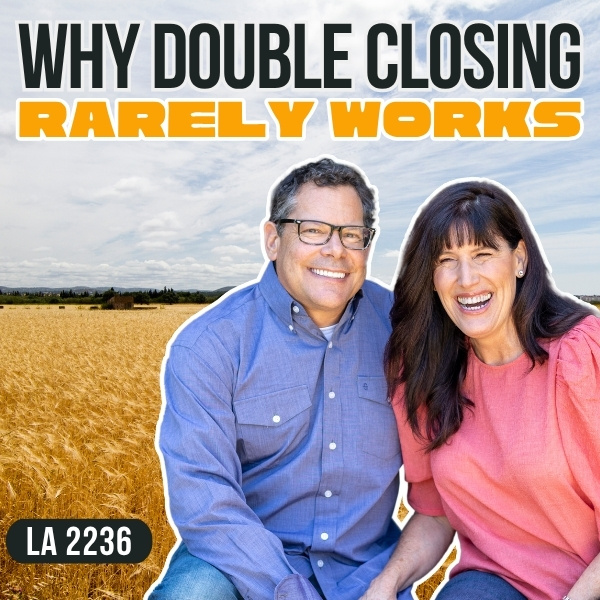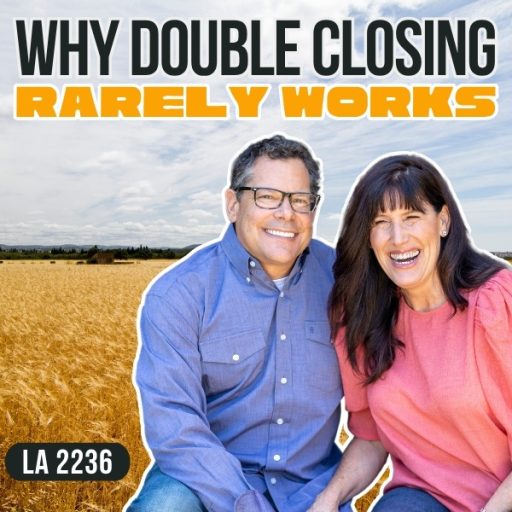This is episode number 2236. Jill and I are talking about why double closing land rarely works and what’s better.
You and I were watching a YouTube video. For whatever reason, I don’t know if it was a commercial, or it happened to be what we were watching. They had In-N-Out. Am I dreaming that?
No, now that you mention it.
Do you remember seeing In-N-Out burgers? I have to just pause and say, when I read this title, the double closing made me think of a double cheeseburger. I have to just put that out there. We have no food in our house right now, so I might even be willing to make the sacrifice and go get it if we need to.
You will go to get In-N-Out?
Yes. When was the last time we had In-N-Out? It’s probably been months.
Nobody east of Arizona even knows what that is.
It’s a West Coast White Castle.
Yes, that’s it. It is perfect.
Thank you. I have had White Castle once.
It’s two or three notches below McDonald’s.
It is not. It’s above McDonald’s. If you want to talk about it, I did not appreciate the soggy bun.
These people who are born and bred in Southern California are taught by their parents and by their teachers that they are the elite group of Americans. They all design stuff, and then it just works its way east.
That sounds very negative. I do not believe that.
You, my friend, are the exception. I mean that.
I’m just saying, come on. East Coast people have their own things. There are people who are New York nutty and will never live anywhere else. I’m not putting it down. I’m just saying they so love it, and it’s the best.
I’ve never lived anywhere.
I know a lot of cities that are like that when you think about it. I know little mountain towns that have really big heads.
I’ve never lived anywhere where I’ve hardcore defended the town that I’ve lived in, where I’m from, or any of that. I don’t know why. Maybe it’s me.
Maybe it’s you.
Did you ever just seriously defend Garden Grove? Do you see what I mean? You laughed. It is because I have not defended Detroit.
I’m sorry. Did you just say what I think you said? This is good. Garden Grove is in the house.
Detroit, too. Detroit is awesome. That was a great adolescent experience I had there.
That’s great.
In fact, I don’t even aspire to live anywhere else.
I am very proud of my background. I love it. I don’t brag about it, like, “It’s not like what I had in Garden Grove.”
I’m not knocking Michigan or California. They are two great places. Detroit and Los Angeles have some severe problems that they’re not going to recover from.
Nobody had it as great as we did in Garbage Grove.
What are we even talking about? Hamburgers are how we got this.
Sorry. This topic is going to be over fast. This is what we’re doing. We’re going to explain it. This topic is a disaster. Go ahead.
Each day on the show, we answer a question from our Land Academy member Discord forum. We take a deep dive into land-related topics at your request. I want to know why it’s going to be a disaster. I can’t wait to hear this.
I have a lot to say. It’s horrible.
This is Jill’s show. Get some popcorn.
I need to sit on my hands.
Jill doesn’t rant very often, but I feel it coming.
Photo Tips For Land Deals
First, the question. Scott R. wrote, “Hello, all. I just finished Land Academy version 3.0 and am gearing up for my first mailers, hopefully. It seems like photos are a critical part of the sales side of things. What best practices do you have or recommend for finding local photographers in a given area that can shoot the land, drone footage, etc.? I don’t have any specific area in mind at this time. I am just more looking to understand the process of procuring photos, as well as the directional costs for the service. I appreciate any feedback you’re able to provide. Thanks.”
I’m willing to bet that by the time we have read this question, because it’s probably been in Discord for a couple of days, there have been people going, “Here’s what I usually spend. Here’s a list of what I do. By the way, I have a guy for this area, this area, and this area.” That’s the power of your community and Discord. It’s just like that.
In the whole scheme of things, internet marketing and how you present whatever you’re trying to communicate, whether it’s selling a piece of land or whatever you’re trying to communicate, are imperative. Think about if you go on Facebook Marketplace, just out on Google, or anything else, because you’re thinking about buying yourself a new car or your daughter a new car. There is one picture with one description saying, “I’m done with this car. It’s $22,000. Here’s my phone number.”
It’s not the picture. It’s the picture when they bought it because they’re too lazy to lift their right finger on their phone. Which one do you want? There are opposite extremes there. The opposite extreme is, “Here’s this amazing piece of property. Here are 100 pictures of it. Here’s some drone footage.” This is the opposite extreme. I’m not saying you should do this. There’s me walking around the property with Jill with a GoPro.
We are camping.
We are just staying there, having a blast. We are showing everybody how you can use it, what’s possible, and all the attributes. Which one are you more likely to respond to in a favorable way? You have to find a medium between those two that you’re comfortable with and that works. It’s economical, and it’s not grossly time-consuming. You can waste your whole life creating marketing scenarios on the internet. It’s not my favorite part of this business.
Not only that, every single time we accidentally visit our land, all of a sudden, Jack goes and removes it from the for sale list.
Only to be sold two years later.
Exactly, when he’s not looking. This is the problem, too. If you stay on your land, there’s a good chance you’re going to keep it, so be careful.
It’s all true. Pictures are imperative. If you go to LANDIO.com, this is a member of the Land Academy. I think he’s still a member. He’s just a master marketer. The way that he presents land is just the end. It’s a ten out of ten star presentation. You need pictures. You need a great description. If you can get a video, that’s even better. In this day and age, I can’t imagine selling anything without a video unless the land is terrible, like in the middle of the desert, and you can’t get to it. You only paid $1,000 for it. On a $1,000 piece of property that you’re selling for $2,500, you’ve got to have pictures.
You still want pictures and stuff, too. You still want to do that. You want to properly convey what it is.
You just can’t go broke doing that. You’ve got to find out where it makes sense.
You can’t spend $1,000 on the stuff. If it’s a $40,000 property, you can.
The Flawed “Double Close” Process
This episode’s topic is why double closing land rarely works and what’s better. Here’s the definition of double close. Steam comes out of Jill’s ears. I’m going to send out a bunch of mail. Somebody signs my offer and sends it back. I call the seller and say, “Does $20,000 work for you? It works for me.” I don’t even look it up. I don’t care about the property. I don’t care about the person that I’m talking to on the phone. I’m signing it. They signed it. I’m signing it. It’s under contract. I theoretically open escrow.
It is an equitable title.
That is correct. The seller is all excited because chances are you didn’t renegotiate the deal. $20,000 is great. It’s more than they thought they would get. In 30 days, they’re expecting some money. Instead, what you do is you go re-market the property for $30,000. By the way, there’s no math. There’s no due diligence. There’s no, “I’m going to check to see if this is a good deal.” I don’t care about Mrs. Smith, the seller. It was just a one conversation I was going to have. I don’t even look at her as a human. I just look at her as somebody who I’m going to make $10,000.
There’s $20,000 purchase price. I don’t ante up at all. I open escrow, remarket the property, and shop it all over the internet everywhere. The core of my business is remarketing and trying to reach as many people. If you’re in this business for more than ten minutes, you get 300 emails from people who are trying to resell property like that, houses, and land. A very small percentage gets resold. What ends up happening is that double closing is irresponsible. The person who’s orchestrating it doesn’t care at all. They just want the $10,000. They want to repeat it over and over again. They’re almost always out of business a year later.
Legal & Practical Pitfalls Of Double Closing
It’s hard. The thing about it, too, is there are a lot of escrow companies that are putting the kibosh down on that, number one. Number two, I know too many people don’t even really properly tell the seller what’s going on, like you just said. I’m sure there are some that say, “Here’s a deal. I’m going to go do this.” You’re giving me the option. “I’m going to go now, put it on the internet, and see if I can get you your $20,000.” They don’t even understand it.
The other thing is, too, there’s a gray area in the middle. You’re not the owner. You’re running around trying to sell a property on behalf of the owner with this equitable title. Some states are cracking down on that, saying, “You need to be an agent or something here.” It is because there’s a gray area where it almost looks like you could be representing that seller. You’re taking this commission, or whatever you want to call it, the triage in the middle here. That could be a problem. There are a lot of states that are putting their foot down and not aligning with it. I agree with that.
We’ve never done that. It’s never been my jam. We’ve always had the feeling that if I love the property, I’m buying it. I am putting my money where my mouth is. I own it. I never get in trouble for that. That’s what’s so great. When I’m selling property, someone calls about something. I’m like, “No, it’s mine. I own it.” I can do whatever I want with it. I can sell it right now or not sell it. I could sell it this way or not sell it that way. I have all the control.
Some of the things that can go wrong, too, are these. Let’s just say your scenario is going perfectly. You do everything right. You explain it to Mrs. Smith. “Here’s what I’m going to do. I’m going to go out and try to shop for it.” It’s taking a little time. It is because you don’t care about it. Remember, you didn’t put any money down. You’re trying to sell it, but you’ve got six other ones that you’re lurking on, too. You forget about Mrs. Smith.
You don’t want to check in very often. Another six weeks go by, and you get a bite. They want to buy it. You’re like, “It is awesome. It’s $28,000. It’s not $30,000 or $35,000 that I was going for, but so what? I’m going to call Mrs. Smith and put this all together.” Mrs. Smith doesn’t answer. She thought you forgot about her. She moved on. She changed her mind. She decided to keep it. She listed it with an agent. She sold it to her brother, or something like that. It is because all this time has passed. She’s like, “He’s not selling it, but maybe it’s worth something.”
You were playing her for a fool.
“I’m going to see if I can sell him out. He never called me back. I’m just going to go do this.” You’re like, “I wasted all that time, all that energy, and all that. Hold on, Jill. I have an equitable time. I have a piece of paper.” Do you really want to sue Mrs. Smith at this point? Are you going to do that? No, you’re not. It’s not worth it. There’s probably going to be some legal things that could come back your direction that will make it not worth your while.
This business model, from start to finish, is tainted, bad, and slimy. You are circumventing all the stuff that makes good real estate investment profitable and good, good for the seller, good for the buyer, and good for the user.
As much as I’m against people who go get a loan real quick, buy the property, do whatever with the loan, and try to pay it off real quick, I would much rather you do that.
Do you know how much time and resources this takes with this business model versus sifting through all this stuff up front? In the example I was using, “Sure. $20,000 works great.” You’re going back and saying, “This probably doesn’t have access. Mrs. Smith, I’m glad you signed the offer. Thank you, but we’re uncovering some other stuff that we didn’t realize about your property. I’ll tell you that $12,000, I can buy it. We can close in a few days. You can be done with it. I’m going to do what I’m going to do with it. Let’s all be honest and straight with each other. I’m happy to take the risks to resell it,” or however you want to explain it to her, without lying and being dishonest.
I love that. I was going to add. What you just said is why we get these deals. I can’t tell you how many deals I buy, own, and have sold. These people might’ve been out there waiting. I’m the one who came in behind him and bought the property. It was for less. “This guy told me he’d buy it from me for $20,000.” I’m like, “Where’d he go? I would’ve done that, too.” She’s like, “I don’t know. I guess it wasn’t real then.” I said, “I’ll give you $12,000.” Like you just said, “I can give you $12,000 right now today. It’s real. I’m here. Let’s do this. I’ve done all my homework. We’ve had the conversation. I’m buying. I’m opening escrow. It will close on the 30th, whatever it is.” “Okay, Jill. Let’s go.”
The Root Cause: Lack Of Confidence & Respect
Over the years, I’ve had the opportunity to ask people pretty repeatedly why people who are in this business of a double close do it this way. Every one of them, without exception, their first reaction is, “What are you talking about? You don’t know what you’re talking about.” I dig deeper and say, “Wait a second. Why don’t you just buy the property?” What I eventually uncovered after asking 50 questions is that they don’t have confidence in valuing an asset and doing due diligence. It is the basic stuff that we do in the Land Academy here and that we teach. They don’t have that personal confidence. Everybody starts with not having that confidence, including me and Jill.
You have us.
You learn by making mistakes. You learn by going to our Thursday call. That’s how you learn. Become a real, actual investor. It’s way more efficient to do 10, 15, or 20 deals a year where you have a relationship with the seller. You’re building a team on your side. You’re employing the right real estate agent for your transaction and making $20,000 or $30,000 a deal. If you’re doing 10, 20, or 30 deals a year, that’s between $300,000 and $1 million a year. You’re sleeping well at night.
I’d say another reason when I asked people why they’re doing it, it’s like, “I don’t have the money.” “I do. Let’s make sure it’s worth $20,000.” I’ll come back and go, “It’s not worth $20,000.” It comes to your thing. “It’s not worth $20,000, but it’s worth $10,000.”
I have respect for real estate. I have respect for money and people.
I do, too.
In that business model, there’s no respect for any of that. It’s just burned through it. Take out of it what I think I should take out. I have yet to see anyone who’s still in business after years of doing it that way, but we’re all still here. Join us in the next episode where Jill and I discuss the best way to find off-market land deals in 2025. It is, after all, off-market week. You are not alone in your real estate ambition. We’re Jack and Jill, information and inspiration to buy undervalued property.















